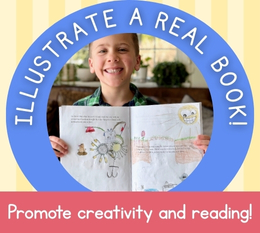The Old Schoolhouse® Product & Curriculum Reviews
With so many products available we often need a little help in making our curriculum choices. The Old Schoolhouse® Magazine family understands because we are in the same boat! Do you need more information on a product before you buy? With over 5,500 products listed in 52 easy-to-use categories, much of the information you need to know is only a click away! Let our reviewer-families help yours.
Kindergarten with your Three to Six Year Old Review by Nancy K. Baetz
By: Donna SimmonsChristopherus Homeschool Resources
- Practical Waldorf at Home -
One of the delights of homeschooling is the array of materials and information at our fingertips. There are so many publishers, authors, styles and philosophies out there for the taking. We become familiar with a publisher and therefore we begin to trust them if their products fit us and enrich our homeschool. Certain authors become our "friends" and as we work out our style and teaching method using what they have written we become more at peace with our homeschooling efforts.
But what about philosophy? There are so many names out there that we find, and to new homeschoolers it can be daunting. Who was Charlotte Mason? What is Montessori? Have you ever heard of Robinson? What about Weaver? Thankfully, there are many people out there who can help us to understand the different philosophies represented within a product, and many resources to help us see what will work for us, and if it will enhance our own homeschooling worldview.
Christopherus Homeschool Resources are inspired by Waldorf Education, which is derived from the teachings of Rudolf Steiner, a proponent of Anthroposophy. Noah Webster broke the word down according to its Greek roots: Anthropos'ophy, n. [Gr. man, and wisdom.]
Knowledge of the nature of man; acquaintance with man's structure and functions, comprehending anatomy and physiology.
By its definition, this term sounds as if there would be no discernable argument with Christian beliefs, but it is important for those interested in this curriculum to know that Rudolf Steiner has mixed a number of ideas together, spirituality, mysticism, etc., as the basis for his belief system. Although this may not be considered a "religious" curriculum, the threads of the philosophy he held are woven throughout.
As Christians, we have been given the whole of God's Creation as our classroom. We must discern, though, what is good for us to teach our children. Many times we must toss out what doesn't go with our worldview, what doesn't fit according to our beliefs. 1 John 4 chapter 1 tells us to always test the spirits.
So, what about this Waldorf education? Although some of the semantics of Christianity are found within, careful comparison doesn't equate it to Biblical Christianity. However, I did find some good, common sense teaching tips and other useful information in this book.
Donna Simmons shows us how activity, senses, surroundings, imitation and creative play are some of the main areas to focus on in teaching little ones. She puts a lot of emphasis on play, which of course is the way children learn! She says "Ironically, in the name of academic excellence, people shortchange their children of the very experience they need to develop their later intellectual abilities." (This is in relation too much adult directed activities. Page 5) She talks about family rhythms as a basis for learning. This sounds very much to me like the lifestyle of learning that many homeschoolers have.
Mrs. Simmons shares that with small children you must make definite plans about the role the computer and TV play in your home. There also needs to be consistency in mealtimes and sleep needs. Transitions between one activity and another can mean a lot when it comes to sanity in the home. Additionally, make sure that you and your partner integrate your religious / spiritual beliefs into the family. (Page 9) These beliefs and rituals will be the backbone of your homeschool.
"We are homeschoolers and as far as I'm concerned, homeschooling is about family." Mrs. Simmons says this on page 9 also. Her book is full of these kinds of simple yet profound statements that we can all agree with!
Homeschool Mom's need someone to come along side us and say things to us like "find what works for you!" Or "make sure you have individual time with each child" "Learn to combine, compromise and be flexible." These are the things we learn from the author and she is quick to tell us that although she herself went to a Waldorf school as a child, and that her method of Waldorf at home is not the same as a Waldorf kindergarten. (The latter based on the needs of a group to a greater degree.)
All of the things we know are important to a growing, learning child, like dressing up, creating art, good open ended imagination based toys, (not grotesque movie based junk) we are reminded of here. Finding quality and nourishing playthings that promote peace and do not cause over-stimulation in the home are just a few of the many ideas Mrs. Simmons has that are common sense, practical words that we need to hear.
She has a lot to say about the electronic media and how harmful it can be. Kids need to move! Being stuck on the computer or game box does not encourage this; in fact it is the exact opposite. Also, the content ---she says that young children cannot discern between truth and fantasy. It is up to you to discern if the story is true and beautiful, and then decide whether to teach it or not. These types of basic, fundamental day to day answers to our dilemmas are important! I know many homeschoolers who seem to have their children's best interest at heart, but when it comes down to popular media, they "go with the flow." I truly appreciate what Mrs. Simmons has to say on this subject!
Some quotes and ideas from Mrs. Simmons:
"Surround your child with good example and do what you need to do!"
"Think it though and be consistent."
Use schedules as guidelines only, not fixed in concrete.
The presence of a calm parent is irreplaceable!
Think "soul nourishment" not "tasks accomplished."
The simple importance of snacks! Kids need fuel and can't wait as long as we can.
She has also included many detailed instructions for actual activities, crafts, nature projects etc., along with lists of websites and books. We all know there is no cookie cutter homeschool---we are all different and have different needs. As far as the spiritual philosophy behind Waldorf, it is your responsibility to make sure that anything you choose to use to teach your children is in line with what you and your spouse have deemed right.

















































